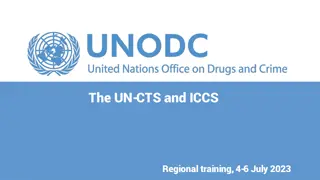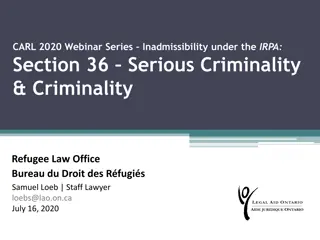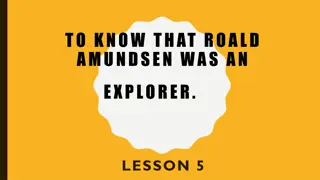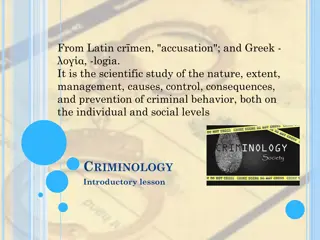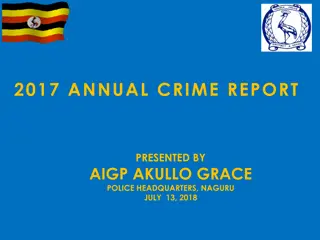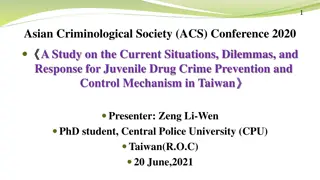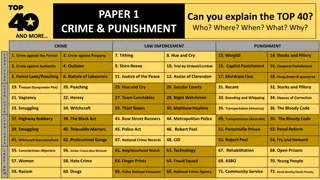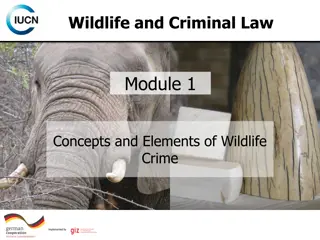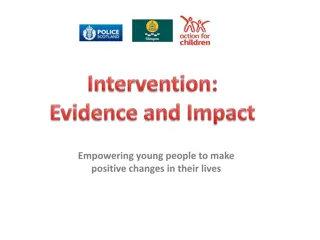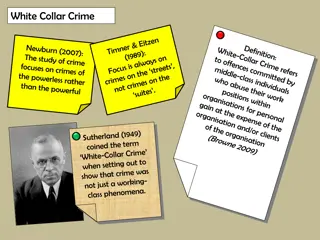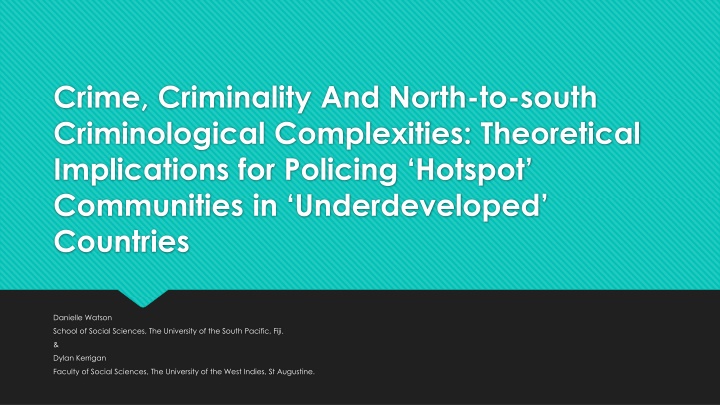
Criminological Complexities and Policing Strategies in Underdeveloped Countries
Explore the theoretical implications of crime and criminality in underdeveloped countries, focusing on policing strategies and cultural considerations. Understand the challenges faced in addressing crime in these regions and the need for context-specific solutions.
Download Presentation

Please find below an Image/Link to download the presentation.
The content on the website is provided AS IS for your information and personal use only. It may not be sold, licensed, or shared on other websites without obtaining consent from the author. If you encounter any issues during the download, it is possible that the publisher has removed the file from their server.
You are allowed to download the files provided on this website for personal or commercial use, subject to the condition that they are used lawfully. All files are the property of their respective owners.
The content on the website is provided AS IS for your information and personal use only. It may not be sold, licensed, or shared on other websites without obtaining consent from the author.
E N D
Presentation Transcript
Crime, Criminality And North-to-south Criminological Complexities: Theoretical Implications for Policing Hotspot Communities in Underdeveloped Countries Danielle Watson School of Social Sciences, The University of the South Pacific, Fiji. & Dylan Kerrigan Faculty of Social Sciences, The University of the West Indies, St Augustine.
Presentation Focus Problem overview Social, Cultural & Ideological Considerations: Understanding the Margins Northern Theories as Southern Solutions: The force-to-fit Matrix - Formulating Southern Solutions Relevance of Research from the Margins: The Case of the Citizen Security Program (CSP) in Trinidad & Tobago Final Considerations
Problem Overview Complexity of societies with diasporic histories & culturally unique positions on crime & criminality o - Cumulative historical disadvantage - Arguably high levels of societal dysfunction Societies that defy first world arguments on acceptable codes & norms of conduct & behaviours o Deficiency of generalized criminological positions o
Social, Cultural & Ideological Considerations: Understanding the Margins Southern Problems Northern Solutions
Social, Cultural & Ideological Considerations: Understanding the Margins (cont d) Problems with proposed solutions Solutions underscored by foreign contextualization Solutions framed independently of culture, history and populace they are re-set to serve Problems in the South The violent colonial & post-colonial histories of Caribbean territories (Job 2004) Caribbean people s resistance to monoculturalism as pursued by neoliberal globalization (Mignolo 2000, Sheller 2012) Continued exploitation, discrimination and racism faced by the majority of residents of T&T(Kerrigan 2015)
Northern Theories as Southern Solutions: The force-to-fit Matrix Northern one-size-fits-all approaches Perpetuate ideologies of modernization and assumptions about borrowing from the North as a requirement to advance developmental status of the subordinate Caribbean South Suggested areas of significance to the formulation of Southern Solutions Revisit foreign signifiers of appropriateness Interrogate borrowed solutions & theories Review borrowed policies Re-assess knowledge foundation of foreign experts
Formulating Southern Solutions Foreign signifiers of appropriateness Ideologized codes of conduct reflecting remnants of a colonial past Assumed moral appropriateness of foreigners & elite few - Use of offensive language - Contradictory globally accepted behaviours N.B. Where laws contradict upheld value systems, there is the likelihood of problematic interface between the upholders of the law and the populace. Borrowed solutions and theories Broken Window Policing or Zero Tolerance Policing Initiative Model Station Initiative Community Policing Initiative Special Anti-Crime Unit
Formulating Southern Solutions (contd) Knowledge foundations of foreign experts Touted foreign experts ignorant of context and culture Borrowed policies Strong elements of the Royal Constabulary colonial model with minor emphasis on service provision endure Enduring history of problematic police/civilian relations are likely to impede dispersal of the model Inapplicable Foreign Policies eg. T&T Use of Force Policy 11 foreign documents Intermediary methods not facilitated in training Reference to resources not available locally Outsourcing instead of collaboration eg. Canadian top-cop, foreign consultants with full team of foreigners Exclusion of civil society from reform efforts - - -
Relevance of Research from the Margins: The Case of the Citizen Security Program (CSP) in Trinidad & Tobago Local Political Culture & Institutional structure of the Government of Trinidad & Tobago Nepotism Solidarity networks Redistributive accumulation ethno-racial political competition Thin simplifications informal systems and processes resistance to change Promise as the language of politics
Final Considerations Any formulation of a Caribbean Criminology requires a recognition of a region unique in its social, economic and political configuration. There is need to acknowledge the diversity & distinctiveness of the territories Policies and practices intended to action change in the Global South should reflect experiences from the South and positions informed by Southern historical, cultural and ideological underpinning. The culture of disloyalty to positions of othered groups need to be considered. The intention is not to discredit the validity of all Northern influences on crime control but to question the general applicability of such responses.


